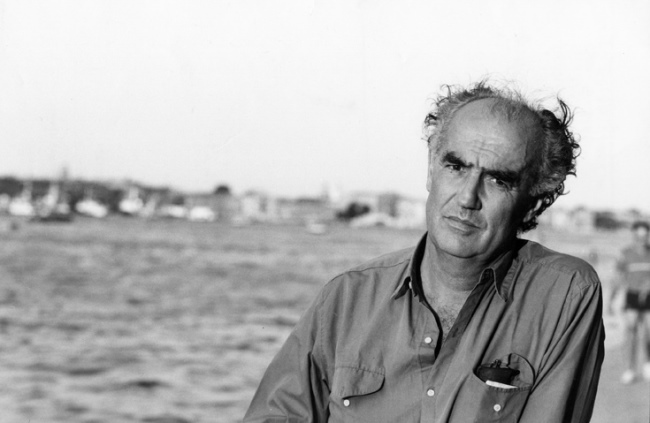Luigi Nono, Intolleranza 1960
By Peter Laki
Born January 29, 1924, in Venice
Died May 8, 1990, in Venice
Composed in 1960–61
Premiered on April 13, 1961, at Teatro della Fenice in Venice with the BBC Symphony Orchestra conducted by Bruno Maderna
Performance Time: Approximately 75 minutes
Fifteen years after the end of World War II, the wounds of Europe were far from being healed. Italy in particular had barely begun to come to terms with the legacy of fascism; the country had a profound economic and political crisis to overcome. Luigi Nono came of age as a composer during these turbulent times. His first mature composition, written in 1950, was a series of variations on a tone row by Arnold Schoenberg, whose daughter Nuria he married five years later. Nono, who joined the Italian Communist Party in 1952, combined his revolutionary agenda with the avant-garde style of the Darmstadt school of which he was a prominent member.
Intolleranza 1960 is the culminating work of Nono’s first artistic period. The composer called this one-act opera an azione scenica, a “stage action” in which the plot proceeds in brief episodes resembling a series of snapshots. The protagonist (The Emigrant) is an innocent miner returning home from a period of work abroad. He is arrested on his way, tortured, sent to a concentration camp, and finally released, only to reach his home at the precise moment when a new disaster—a catastrophic flood—strikes. The stages of the Emigrant’s journey are marked by two women—one who becomes his enemy when he leaves her behind, and another who joins him as his new Companion. There are five main characters in all, representing five voice types to cover the entire spectrum of the human voice: the two women (soprano and contralto), the Emigrant (tenor), an Algerian who joins him during his escape (baritone), and a tortured man (bass-baritone).
Nono had originally conceived the work in collaboration with poet Angelo Maria Ripellino, who was also a scholar of Russian language and literature. Ripellino composed an extensive libretto, of which Nono ended up using less than half, causing a major rift between the two former friends. Ripellino augmented his original lines with quotes from various sources, including Paul Éluard’s famous poem Liberty, Vladimir Mayakovsky’s Our March (concluding Part I), and Bertolt Brecht’s To Those Born After (concluding Part II). The spoken excerpts describing or reflecting on torture are by Henri Alleg, a French-Algerian journalist who fought for Algerian independence and was tortured by the French; Julius Fučík, a Czech journalist killed by the Nazis; and Jean-Paul Sartre, in whose seminal philosophical oeuvre an entire era of violence and devastation found its most eloquent expression. This textual collage broadens the work’s scope of references to include World War II; the atomic bomb; the Algerian war of independence; the reappearance of neo-fascist elements in Italy; the mining disaster in Marcinelles, Belgium, where more than 300 people were killed in 1956; and the 1951 flood in Polesine in the North of Italy, where a hundred people died and more than 180,000 lost their homes.
Man-made disasters exacerbate natural ones throughout Nono’s “stage action,” which makes clear that it is only a small step from intolerance to torture and annihilation. The composer’s message of protest is expressed by means of vocal and instrumental lines spanning a wide range and projecting extreme dramatic tension. The sounds of the live musicians are complemented by choruses relating “absurd scenes from contemporary life.” The original production was a real Gesamtkunstwerk involving sets and costumes by Emilio Vedova and stage direction by Josef Svoboda, the founder of the world-famous Laterna magica theater of Prague. The stage was divided in up to six different areas in which simultaneous actions were taking place.
The world premiere of Intolleranza 1960 took place at the Teatro della Fenice in Venice on April 13, 1961, at the 24th International Festival of Contemporary Music held during the Venice Biennale. The performance, with Bruno Maderna conducting the BBC Symphony Orchestra, caused a scandal. The great poet Eugenio Montale, future Nobel Prize winner, was in attendance; in his review published two days later, he wrote:
The work’s reception was stormy as one could expect, given the plot and the provocations in the music. The two
acts came off with great difficulty, among boos, shouts, altercations, fascist flyers raining down from the galleries…
It should be remembered that in the early 1960s the neo-fascist Movimento Sociale Italiano (Italian Social Movement) was the fourth-largest party in Italy, and violent clashes between rightist and leftist forces were rather frequent in the country.
Following this premiere, Intolleranza 1960was not performed again in Italy in the original Italian for 50 years, although it had several successful stagings in German translation, mostly in Germany. In 2018, intolerance is once again, unfortunately, a timely topic, and Nono, who fought against cruelty and injustice with his music, has much to say to those who, in the words of Bertolt Brecht quoted in the piece, were “born after.”
Peter Laki is Visiting Associate Professor of Music at the Bard College Conservatory of Music.

